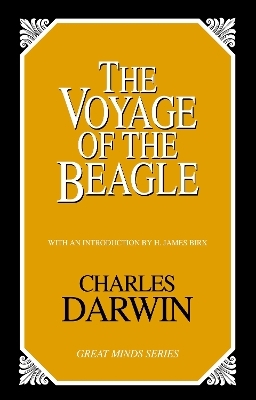
The Voyage of the Beagle
Prometheus Books (Verlag)
978-1-57392-773-4 (ISBN)
- Keine Verlagsinformationen verfügbar
- Artikel merken
Inviting in its lavish detail, this is Darwin's fascinating account of his five-year journey aboard the Royal Navy ship HMSBeagle(1831-1836) as it surveyed the coasts of South America, New Zealand, Australia, and the now famous Galapagos Archipelago. One of the most important voyages of the 19th century, this is where Darwin made the observations that led to his theory of evolution by means of natural selection, which emerged two decades later. The Voyage of the Beagle (1840-43) has delighted and enlightened millions because of Darwin's loving and insightful observations of the plants, animals, people, and locations he explored. These journals provide striking examples of the great scientist's reasoning ability and intriguing glimpses into his thought processes. They are the precursor to The Descent of Man (1871, 1874), a controversial leap in evolutionary theory from nature to humanity.
CHARLES DARWIN was born in Shrewsbury, England, on Feb-ruary 12, 1809, to a wealthy and distinguished family: his father, Charles Waring Darwin, was a noted physician; his paternal grand-father, Erasmus Darwin, was a physician, poet, and radical free-thinker; and his mother, Susannah Wedgwood, was the daughter of the potter Josiah Wedgwood. Charles attended school in Shrewsbury, where he showed no special distinction, from 1818 to 1825. In 1827 he entered Christ's College, Cambridge, to study for holy orders, but soon abandoned all thought of this to pursue his interest in natural history. After completing his degree in 1831, Darwin embarked on a five-year global expedition aboard the H.M.S. Beagle. This voyage gave the young scientist an opportunity to observe nature at first hand and to gather material that would form the basis of his later work. Following his return to England, Darwin married his cousin Emma Wedgwood. They settled at Downe, in Kent, where Darwin lived and worked for the remainder of his life. There he pursued the research that would lead to the groundbreaking theory of evolution. Darwin was profoundly influenced by a reading of Thomas Malthus's On Population, which argued that the human birthrate was held in check by the limited availability of food. Applying Malthus's model to the animal kingdom, Darwin hypoth-esized that, since the animal population cannot increase its food supply, the more well-adapted will survive and produce offspring, while the less well-adapted will necessarily be eliminated. The offspring of the hardy will inherit their parents' healthy traits and in turn produce better offspring; hence each succeeding generation will become more suitably adapted to its environment, leaving the less hardy competitors to die off. In 1859 Darwin published his theories in what he called an "abstract" titled On the Origin of Species by Means of Natural Selection. In it he demonstrated that evolution was an automatic process excluding all divine agencies, and that man had evolved by natural processes. Darwin's book created a sensation and set off a storm of controversy. But while denounced by theologians and even many scientists, Darwin's ideas won wide acceptance among more progressive thinkers. His work exerted a major influence on the development of biology; likewise on research in morphology, paleontology, and embryology. Following the publication of On the Origin of Species, Darwin continued to devote himself to his studies of animals and plants, and human evolution. Charles Darwin died on April 19, 1882, at Downe. Darwin's other published work includes Journal of Researches into the Geology and Natural History of the Various Countries Visited by the H.M.S. Beagle, 1832-36 (1839); Structure and Dis-tribution of Coral Reefs (1842); Geological Observations on South America (1846); The Variation of Plants and Animals under Domestication (1868); and The Descent of Man and Selection in Relation to Sex (1871).
| Erscheint lt. Verlag | 1.11.1999 |
|---|---|
| Reihe/Serie | Great Minds Series |
| Verlagsort | Amherst |
| Sprache | englisch |
| Maße | 152 x 229 mm |
| Gewicht | 454 g |
| Themenwelt | Literatur ► Essays / Feuilleton |
| Reisen ► Reiseberichte ► Südamerika | |
| Naturwissenschaften ► Biologie ► Evolution | |
| ISBN-10 | 1-57392-773-2 / 1573927732 |
| ISBN-13 | 978-1-57392-773-4 / 9781573927734 |
| Zustand | Neuware |
| Haben Sie eine Frage zum Produkt? |
aus dem Bereich


